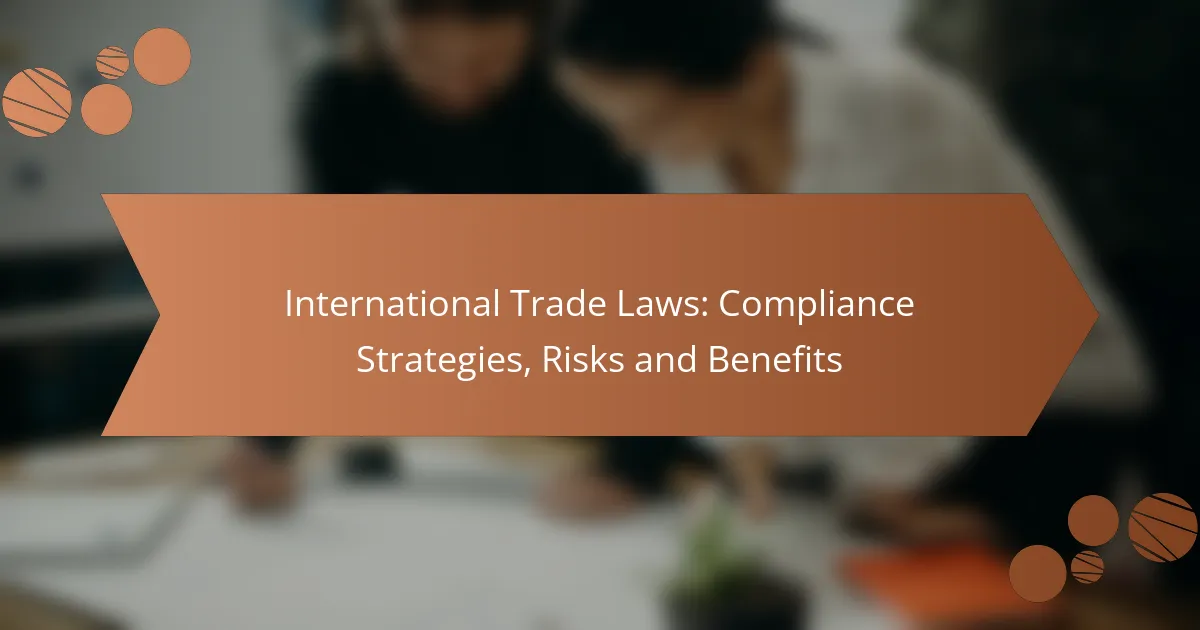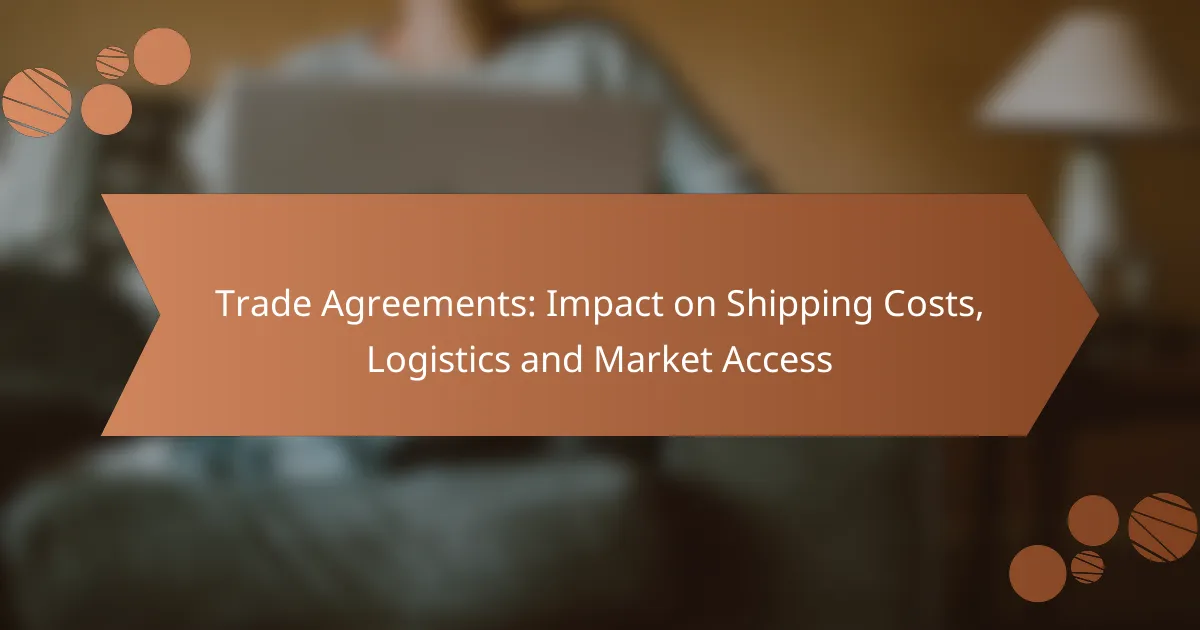International trade laws play a crucial role in shaping the landscape of global commerce, requiring businesses to adopt effective compliance strategies. By adhering to these regulations, companies can mitigate risks such as financial penalties and legal issues while also reaping the benefits of market access and operational efficiency. Understanding the intricacies of compliance not only safeguards a company’s reputation but also positions it for success in the competitive international market.
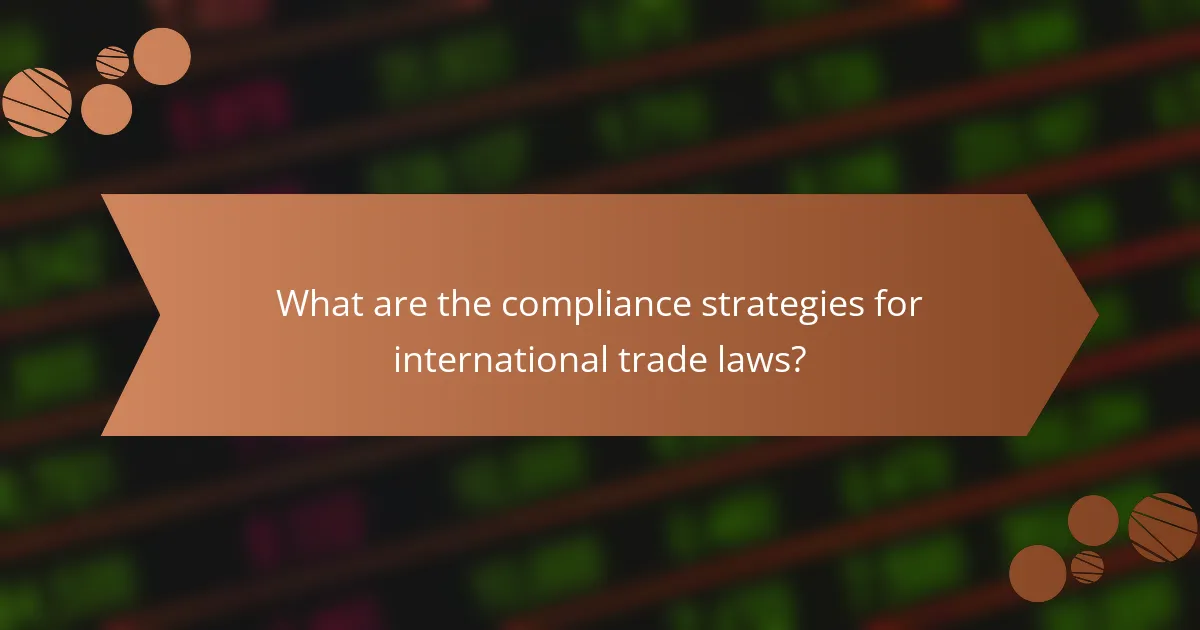
What are the compliance strategies for international trade laws?
Compliance strategies for international trade laws involve systematic approaches to adhere to regulations governing cross-border transactions. These strategies help businesses mitigate risks, optimize operations, and leverage benefits from trade agreements.
Customs compliance management
Customs compliance management ensures that all goods entering or leaving a country meet legal requirements. Companies should maintain accurate documentation, classify products correctly, and declare values appropriately to avoid penalties. Regular audits and updates to compliance procedures can help identify potential issues before they escalate.
Utilizing customs brokers can streamline the process, as they are familiar with local regulations and can facilitate smoother transactions. Businesses should also stay informed about changes in customs laws that may affect their operations.
Trade agreements utilization
Leveraging trade agreements can significantly reduce tariffs and enhance market access. Companies should identify applicable agreements, such as free trade agreements (FTAs), and understand the rules of origin to qualify for benefits. This can involve adjusting supply chains or sourcing materials from specific countries.
Regularly reviewing trade agreements and engaging with trade associations can provide insights into maximizing benefits. Businesses should also consider the implications of trade agreements on their competitive positioning in the market.
Risk assessment frameworks
Implementing risk assessment frameworks helps identify and mitigate potential compliance risks associated with international trade. Companies should evaluate factors such as regulatory changes, geopolitical risks, and supply chain vulnerabilities. A structured approach can include risk scoring and prioritization to focus resources effectively.
Regularly updating risk assessments based on market conditions and regulatory changes is crucial. Engaging with legal experts can also provide guidance on navigating complex international regulations.
Training and education programs
Training and education programs are essential for ensuring that employees understand international trade laws and compliance requirements. Regular workshops and seminars can keep staff informed about best practices and recent changes in regulations. Tailoring training to specific roles within the organization can enhance its effectiveness.
Encouraging a culture of compliance through ongoing education helps reduce the likelihood of violations. Companies should also consider certifications or partnerships with educational institutions to enhance their training offerings.

What are the risks associated with non-compliance?
Non-compliance with international trade laws can lead to significant risks, including financial penalties, legal repercussions, and damage to a company’s reputation. Understanding these risks is crucial for businesses engaged in global trade to avoid costly mistakes.
Financial penalties
Financial penalties for non-compliance can vary widely depending on the severity of the violation and the jurisdiction involved. Companies may face fines ranging from thousands to millions of dollars, which can severely impact their financial health.
In addition to direct fines, businesses may incur additional costs related to compliance audits, legal fees, and potential loss of contracts. It’s essential to budget for these potential expenses when operating internationally.
Legal repercussions
Legal repercussions for failing to comply with international trade laws can include lawsuits, sanctions, and even criminal charges against company executives. These outcomes can lead to lengthy legal battles that drain resources and distract from core business operations.
Companies may also face restrictions on their ability to conduct business in certain markets, which can limit growth opportunities. Understanding the legal landscape and maintaining compliance is vital to mitigate these risks.
Reputation damage
Reputation damage is a significant risk associated with non-compliance, as negative publicity can erode customer trust and brand loyalty. A company found in violation of trade laws may face backlash from consumers, partners, and investors.
Restoring a tarnished reputation can take years and require substantial investment in public relations efforts. Companies should prioritize compliance to protect their brand image and maintain stakeholder confidence.
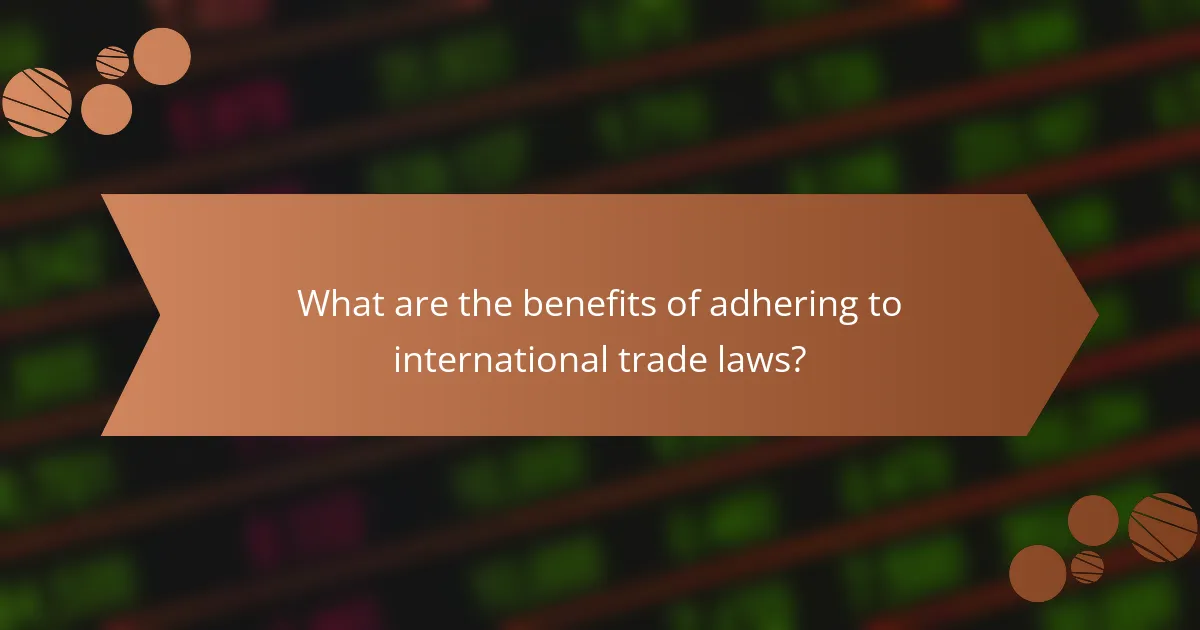
What are the benefits of adhering to international trade laws?
Adhering to international trade laws provides businesses with several advantages, including legal protection, market access, and improved operational efficiency. Compliance helps companies navigate complex regulations, reducing the risk of penalties and enhancing their reputation globally.
Access to global markets
Compliance with international trade laws opens doors to global markets, allowing businesses to expand their customer base beyond domestic borders. By meeting the legal requirements of different countries, companies can export their products and services, tapping into new revenue streams.
For instance, a manufacturer in the European Union can sell goods in the United States or Asia by adhering to the respective trade regulations. This access can significantly increase sales potential and brand recognition in diverse markets.
Improved supply chain efficiency
Adhering to international trade laws can streamline supply chain operations by ensuring that all processes are compliant with regulations. This reduces delays caused by customs issues and enhances the overall efficiency of logistics and distribution.
Companies that follow trade laws can benefit from predictable shipping times and reduced costs associated with fines or re-shipments. For example, a business that understands and complies with tariff regulations can optimize its sourcing strategies and minimize expenses.
Enhanced customer trust
When businesses comply with international trade laws, they build trust with customers and partners. Demonstrating adherence to legal standards reassures stakeholders that the company operates ethically and responsibly, which can lead to stronger relationships and customer loyalty.
For example, a company that consistently meets safety and quality standards in its exports is more likely to gain the confidence of international buyers. This trust can translate into repeat business and positive referrals, further enhancing the company’s reputation in the global marketplace.
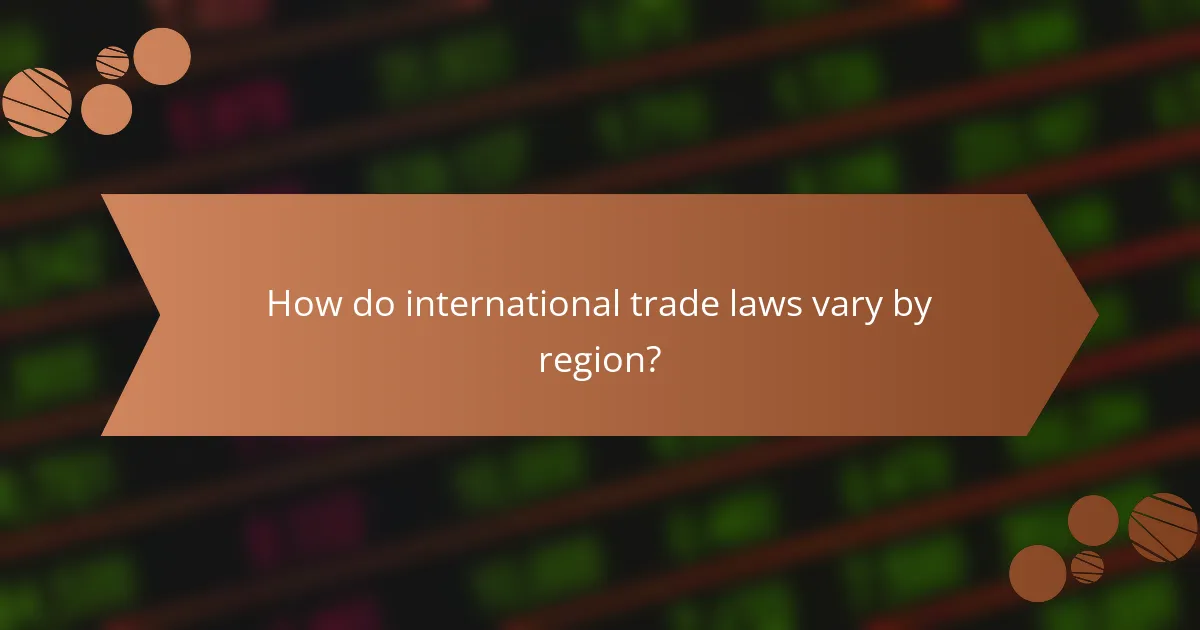
How do international trade laws vary by region?
International trade laws differ significantly by region, reflecting local economic conditions, political climates, and regulatory frameworks. Understanding these variations is crucial for businesses engaged in cross-border trade to ensure compliance and optimize operations.
North American trade regulations
North America primarily operates under agreements such as the United States-Mexico-Canada Agreement (USMCA), which governs trade between the three countries. Key aspects include tariff reductions, labor standards, and environmental protections. Businesses must navigate these regulations to avoid penalties and ensure smooth trade flows.
Companies should be aware of specific compliance requirements, such as customs documentation and product labeling standards, which can vary between the U.S., Canada, and Mexico. Regular audits and training can help mitigate risks associated with non-compliance.
European Union compliance standards
The European Union (EU) enforces strict trade regulations that emphasize consumer protection, environmental sustainability, and fair competition. The General Data Protection Regulation (GDPR) and the EU’s customs code are critical components that businesses must adhere to when trading within the EU. Non-compliance can lead to significant fines and barriers to market entry.
To successfully operate in the EU, companies should implement robust compliance programs that include regular assessments of product standards, labeling requirements, and data protection measures. Engaging with local legal experts can provide valuable insights into navigating these complex regulations.
Asia-Pacific trade agreements
The Asia-Pacific region is characterized by a diverse array of trade agreements, such as the Comprehensive and Progressive Agreement for [censured]-Pacific Partnership (CPTPP) and various bilateral agreements. These agreements aim to reduce tariffs and facilitate trade among member countries, but they also impose specific compliance obligations.
Businesses should focus on understanding the varying tariff schedules and rules of origin that apply across different countries in the Asia-Pacific. Establishing strong relationships with local partners can enhance compliance and provide insights into regional market dynamics.

What frameworks exist for evaluating compliance?
Evaluating compliance involves structured frameworks that help organizations identify and manage risks associated with international trade laws. These frameworks provide systematic approaches to assess adherence to regulations and industry standards, ensuring that businesses operate within legal boundaries.
Compliance risk matrices
Compliance risk matrices are tools that help organizations visualize and prioritize compliance risks based on their likelihood and potential impact. By plotting risks on a matrix, businesses can quickly identify which areas require immediate attention and resources.
To create a compliance risk matrix, start by listing potential risks, assessing their likelihood of occurrence, and estimating their impact on operations. Risks can be categorized into low, medium, and high, allowing for focused mitigation strategies. For example, a high likelihood of regulatory changes in a specific market could be prioritized over lower-impact risks.
Benchmarking against industry standards
Benchmarking against industry standards involves comparing an organization’s compliance practices with those of leading peers or established norms. This process helps identify gaps in compliance efforts and areas for improvement, ensuring that businesses remain competitive and compliant.
To effectively benchmark, organizations should identify relevant industry standards, such as ISO certifications or local regulatory requirements, and assess their current practices against these benchmarks. Regularly reviewing and updating compliance strategies based on industry trends can enhance compliance effectiveness. For instance, companies in the EU may align their practices with GDPR standards to ensure data protection compliance.

What emerging trends are shaping international trade laws?
Emerging trends in international trade laws are primarily influenced by globalization, technological advancements, and shifts in geopolitical dynamics. These factors are reshaping compliance requirements and creating new opportunities and challenges for businesses engaged in cross-border trade.
Digital Trade Agreements
Digital trade agreements are becoming increasingly significant as e-commerce expands globally. These agreements often focus on data flows, privacy protections, and the elimination of tariffs on digital products. Companies must stay informed about these agreements to ensure compliance and leverage new market opportunities.
For instance, the US-Mexico-Canada Agreement (USMCA) includes provisions that facilitate digital trade, which can impact how businesses manage their online transactions and data sharing. Understanding these regulations can help companies navigate the complexities of digital commerce.
Sustainability and Environmental Regulations
Sustainability is a growing concern in international trade, prompting countries to adopt stricter environmental regulations. Businesses must consider how these regulations affect their supply chains and product sourcing. Compliance with sustainability standards can enhance brand reputation and open doors to eco-conscious markets.
For example, the European Union’s Green Deal aims to make Europe climate-neutral by 2050, influencing trade policies that prioritize sustainable practices. Companies exporting to the EU should evaluate their environmental impact and ensure adherence to these evolving standards.
Trade Protectionism
Trade protectionism is resurging in various regions, with countries implementing tariffs and trade barriers to protect domestic industries. This trend can complicate international trade, leading to increased costs and uncertainty for businesses operating globally.
Companies should assess the potential impact of tariffs on their products and consider strategies such as diversifying supply chains or relocating production to mitigate risks. Staying updated on trade policies can help businesses adapt to changing market conditions.
Technological Advancements in Compliance
Technological advancements are transforming compliance processes in international trade. Automation, artificial intelligence, and blockchain technology are streamlining documentation, enhancing transparency, and reducing errors in trade transactions.
Businesses can leverage these technologies to improve compliance efficiency and reduce the risk of penalties. For example, using blockchain for supply chain transparency can help verify the origin of goods, which is increasingly important for regulatory compliance.
